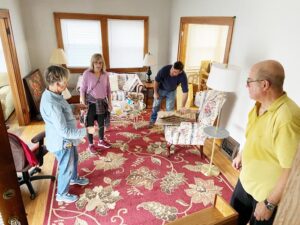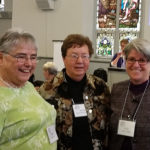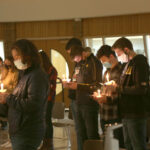
Members of Scott County Catholic parishes, Herman So and Deb Cassel, discuss placement of household items during the outfitting of a house Dec. 15 in Rock Island, Ill., for an Afghan family who will move in next month.
By Barb Arland-Fye
The Catholic Messenger
ROCK ISLAND, Ill. — The pungent scent of multipurpose cleaner permeated the house as volunteers from Scott County parishes scrubbed bathroom sinks and toilets, wiped down cabinets and floors, and vacuumed the carpet for the Afghan family who will live there.
“I think it’s the right thing to do, to take care of the people who helped take care of our security in Afghanistan,” said volunteer Bonnie Byrne as she cleaned a bathroom. A member of St. Paul the Apostle Parish in Davenport, she said, “I’ve never done anything like this before. … “It’s a lot more fun (cleaning) when you’re doing it for someone else.”
Herman So of Muscatine helped move furniture and rolled-up area rugs into the house before joining his wife Sherry in the kitchen to help her stack the dishwasher and place liners on the kitchen cabinet shelves. The couple belongs to Holy Family Parish in Davenport. “We saw the announcement in the church bulletin,” said Herman So, who previously served in the Air Force and felt a connection with Afghans who assisted the U.S. military in their country. “I’m also an immigrant (from China), so I know how hard it can be.”
“There’s a whole army here,” exclaimed Laura Fontaine, executive director of World Relief Quad Cities, which expects to welcome approximately 200 Afghans by Feb. 15. She stopped by the compact two-story house on Dec. 15 amidst her visits to the new homes for Afghan allies who fled their country with the U.S. military’s withdrawal from Afghanistan on Aug. 30.
In October, the agency hosted a summit to educate participants about refugee resettlement and to explore ways that local faith communities can work together to assist refugees arriving in the Quad Cities. Afterwards, Ryan Burchett, a St. Paul the Apostle parishioner and summit panelist, and Deacon Steve Barton of Holy Family Parish spoke with Fontaine about getting parishes in Scott County involved in outfitting homes for Afghans.
Fontaine welcomed the collaboration. Burchett and Deacon Barton circulated a request for donations and volunteers and received assistance from their parishes and from St. Alphonsus and Sacred Heart Cathedral in Davenport and St. John Vianney Parish in Bettendorf. They outfitted a home for a family of 11 – two parents and nine children ages 3-16. This family underwent vetting and received parole to live in the U.S. and to begin rebuilding their life. They will move in sometime in January, Fontaine said. They will receive State Department-funded assistance through the Afghan Placement and Assistance Program.

Volunteers from parishes in Scott County arrange furniture and other household items in a house in Rock Island, Ill., being readied for an Afghan family who will move in next month.
“It’s our discipleship mission as Christians to help people who need help, especially refugees escaping a horrible situation who don’t know the language or the culture of their new home,” Deacon Barton said. Furnishing a home for a refugee family is one way to demonstrate that someone cares about them, he added.
Another way is accompaniment as part of a “cultural partner team” that assists refugees in negotiating life in the U.S. “To have somebody to negotiate things, to be their support is so important,” Deacon Barton said.
The crew of volunteers at the Dec. 15 “Extreme Makeover: Refugee Edition,” as volunteer Gale Francione dubbed it, worked exclusively on outfitting the house and did not meet the family that will move in. “We’re providing them with a place that they can feel comfortable, feel welcome,” Deacon Barton said. “The more people you get involved, the more awareness you build about refugees…. Refugees are here, right in our own backyards.”
Burchett, a deacon candidate for the Diocese of Davenport, interrupted the flurry of activity in the house to gather volunteers in a circle to pray. “We pray for this family who travels here from around the world, not of their own accord but because of violence in their homeland. We remember that no matter their religion, the language they speak, the color of their skin or where their journey began, we are united in our common humanity. We pray that this house be blessed as a home for this special family. We pray that in some meaningful way, these people can feel the love shared by all of the people who donated and helped get this home ready so that the family can feel welcome here in our community.”
Francione, a member of Sacred Heart Cathedral, summed up her volunteer gig in an email to people she had invited to help. “As I figured, it was organized chaos. Probably 15 people worked for 2-1/2 hours, so it was a crowd. And all were pretty helpful. A very steep cement stair up to the house, into a nice, but well-worn home. Five bedrooms (for nine kids and parents) and a bathroom on each of three levels, a tiny kitchen, a sunroom in front that could serve as a playroom, and a laundry room downstairs.” She hopes that other parishes will team up to sponsor another family in 2022.
“I think it’s beautiful that people are welcoming people they don’t even know and making a home for families who haven’t had time to process their trauma,” Fontaine said. For the families, “I think it will help with their integration, to feel at home and safe.”
Resources
Laura Fontaine, executive director of World Relief Quad Cities, welcomes donations and volunteers to help outfit homes for refugees. The agency also needs volunteers interested in training as “cultural partners” to help refugees adapt to their new homeland. For more information, visit (https://worldrelief.org/quad-cities/).
About Afghan refugee resettlement
As of Nov. 30, 2021, 872 Afghans have been admitted to the U.S. for Fiscal Year 2021, according to the U.S. Department of State Bureau of Population, Refugees, and Migration. Many more Afghans await processing. Some 73,000 Afghans have been airlifted to the U.S. since the Taliban took over Afghanistan in August, Reuters reports. Around 45,000 Afghans at U.S. bases are waiting to be resettled, according to The Washington Post. Another 26,000 applications from Afghans wanting to enter the U.S. await review.
U.S. Citizenship and Immigration Services reports that Afghans seeking refugee resettlement, in general, must be given access to the U.S. Refugee Admissions Program. The following priorities are available to Afghans:
• Priority-1 Individual Cases: Cases are identified and referred to the program by the United Nations High Commissioner for Refugees, a U.S. embassy, or a designated non-governmental organization.
• Priority-2 Groups of special humanitarian concern: On Aug. 2, 2021, the Department of State announced a new Priority 2 Designation for certain Afghan nationals and eligible family members (see Refugee Processing Center, https://www.wrapsnet.org/).
• Priority-3 Family Reunification: Spouses, unmarried children under the age of 21, or parents of individuals already admitted to the U.S. as refugees or asylees are in this category.
Church World Service (CWS) reports that most Afghan nationals will be paroled into the United States through the Afghan Placement and Assistance (APA) Program, which the State Department launched on Sept. 1. The APA program offers “temporary legal status in the United States and expedited work authorization. Individuals will be resettled with existing refugee resettlement agencies and connected to various means of support for a 30 to 90-day service period.”
Resettlement agencies provide basic core services similar to core services under the U.S. Refugee Admissions Program, CWS says. “This includes, but is not limited to, airport reception, accessing safe and appropriate housing, providing adequate food supplies, accessing seasonal clothing, accessing health care and other public benefits, as eligible, assistance with school enrollment for minors, cultural orientation and limited financial assistance. The APA program is expected to serve over 50,000 Afghan parolees across the United States.”
An interactive computer system called the Worldwide Refugee Admissions Processing System (WRAPS) processes and tracks the movement of refugees from various countries around the world to the U.S. for resettlement under the U.S. Refugee Admissions Program.
Barb Arland-Fye











